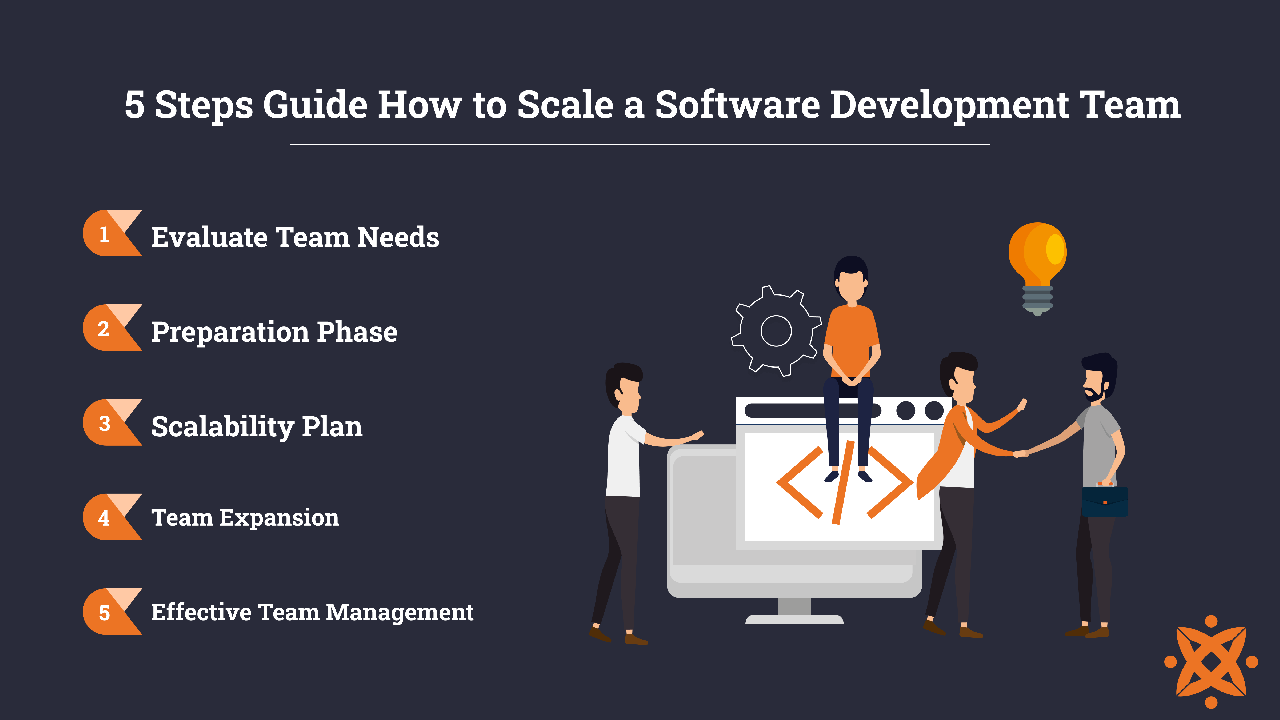
To develop software, you need a team that works cohesively and optimises processes to achieve organisational goals.
However, the most challenging part for any business is scaling this team.
According to research, software development teams face major challenges while scaling: inter-team coordination, architecture, requirements engineering, change measurement, and project management issues.
Most of the challenges make scaling a complex problem for software development teams.
While you are planning to get the best talents on your team and make the most of it, these challenges act as roadblocks.
This article will focus on:
Let’s first address the elephant in the room. “Need for scaling!”

Requirement gathering is the first step towards understanding what factors are needed to consider when choosing a software development company.
This involves evaluating the need for expansion, resources, workforce, and operational challenges.
If you assess the need for scaling, a key indicator is delayed and frequently missed project deadlines.
It indicates that the current workforce may be overwhelmed and need more resources to complete specific tasks.
More bugs, errors, and crashes for your applications indicate team output problems.
This could result from poor allocations, lack of talent, skill gaps in the existing workforce, and even the need for training.
Inefficient resource allocation and skill deficiencies can hurt productivity and growth, causing bottlenecks, inefficiencies, and reduced output.
So, your organisation must assess resource allocations, task delegation, and team productivity.
Assess your team’s communication and collaborations to pinpoint obstacles that may arise from the team's size or remote locations.
This evaluation will assist in preparing for potential challenges when expanding the team and enhancing collaborations.
Assess your team's tools, tech stack, and infrastructure for scalability.
Consider upgrading or adding new tools to ensure your teams achieve their goals and improve productivity.
Assessing the existing workforce and its shortcomings is crucial, but you must prepare them for scaling activities.
For example, you need to have the KPIs to evaluate the performance of your employees because the evaluation scope will increase with the scaled team.
Conduct a thorough analysis of the existing team to identify key strengths and weaknesses. For example, if your software development team has prowess in developing a release rapidly, you need to assess the total number of errors per release.
This will help determine whether your team can deliver excellent software release and testing performance. If the testing phase is where your team lacks resources or there is a skill gap, you can scale it.
This phase involves defining the key objectives of your software development scaling plan. Set key KPIs to measure scaling efforts and fine-tune the process to achieve key objectives.
Once the goals are defined, it’s time to secure the resources you need to scale the software development team.
This includes considerations like the cost of software development, technology upgrades, infrastructure needs, and more.
One of the key factors in securing the resources is to find the right software development company for your projects.
However, the question that baffles many organisations is how do you choose the best custom software development company.
The answer is not that simple!
You need to consider several factors, like:
Once you have all the puzzle pieces in place, it’s time to plan your scaling strategy!
A scalability plan for your software development project includes project pipeline analysis, creating a recruitment strategy, and implementing agile and scalable workflows.
However, if you choose a custom software development company the painstaking recruitment process becomes obsolete reducing cost and efforts for your projects.
So, if you are still wondering what factors are needed to consider when choosing a software development company? You must consider the recruitment factor.
With a custom software company, you don’t need to hire skilled professionals directly which helps improve focus on key business activities.
If you are choosing a custom software development company to scale your team, onboarding and initial training becomes crucial for your organisation.
You may specific set of processes, onboarding procedures, and workflow.
Aqcuanting with the set processes for new talents require an onboarding plan which includes, introduction to agile methodologies, and induction.
Further, you need to define training modules for the teams that you will scale to have every member in the team to be on the same page.
Managing your software development team can be a significant effort especially when you have new talents onboarding and accolomitising into the new environment.
Here are some key tips to use for managing the software development team:
Before scaling a software development team, assess the needs for expansion, resources, and challenges.
Evaluate the current team, define goals, secure resources, and develop a plan with agile workflows, recruitment, and training.
Manage scaled team with expectations, meetings, culture, and Agile practices.
To assess a development team's performance, key metrics include project deadlines, error rates, resource allocation, and productivity.
Meeting deadlines and delivering projects on time are important indicators, along with the number of bugs and errors in applications.
Communication, collaboration, and customized KPIs can further evaluate performance.
When choosing a software development company, consider the following factors:
Custom software development companies can help businesses scale their teams and save time and resources.
The right company can provide support in project management, technical expertise, and project scalability, allowing businesses to focus on their main activities.
Scaling the software development team can become a mammoth task if not planned well.
This guide provided insight on:
But from what we have discussed so far, one thing becomes apparent, choosing the right software development company becomes crucial for your scaling needs.